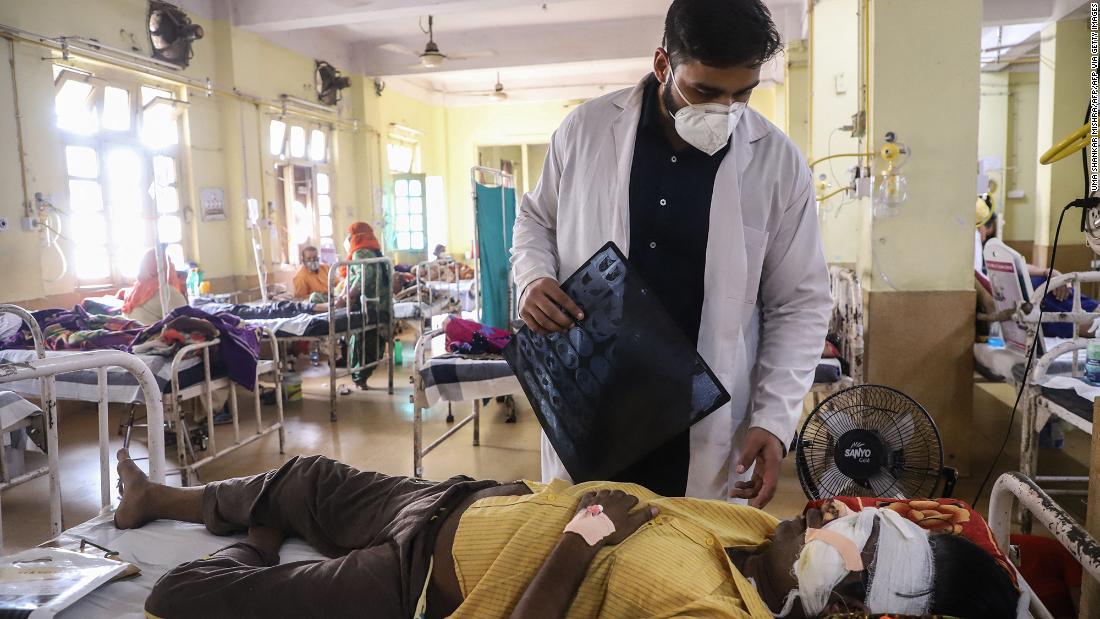You are here
India: insights into "black fungus" and could India's surge protend problems elsewhere
Primary tabs
Fri, 2021-05-21 20:17 — mike kraft
 They recovered from Covid, only to die of 'black fungus.' Here's what we know Many of those infected with black fungus in India are coronavirus patients, or those who have recently recovered from Covid-19, whose immune systems have been weakened by the virus or who have underlying conditions, most notably diabetes. CNN
They recovered from Covid, only to die of 'black fungus.' Here's what we know Many of those infected with black fungus in India are coronavirus patients, or those who have recently recovered from Covid-19, whose immune systems have been weakened by the virus or who have underlying conditions, most notably diabetes. CNN
 They recovered from Covid, only to die of 'black fungus.' Here's what we know Many of those infected with black fungus in India are coronavirus patients, or those who have recently recovered from Covid-19, whose immune systems have been weakened by the virus or who have underlying conditions, most notably diabetes. CNN
They recovered from Covid, only to die of 'black fungus.' Here's what we know Many of those infected with black fungus in India are coronavirus patients, or those who have recently recovered from Covid-19, whose immune systems have been weakened by the virus or who have underlying conditions, most notably diabetes. CNN (CNN) In early May, doctors in India began raising the alarm about a rise in mucormycosis -- a rare and potentially deadly infection also known as black fungus.
Many of those being infected are coronavirus patients, or those who have recently recovered from Covid-19, whose immune systems have been weakened by the virus or who have underlying conditions -- most notably diabetes.
In the past few weeks, thousands of black fungus cases have been reported across the country, with hundreds hospitalized and at least 90 dead. Two states have declared it an epidemic, and the central government has made it a notifiable disease.
Here's what we know about black fungus and its spread in India.
Black fungus is caused by mold found in damp environments like soil or compost, and can attack the respiratory tract. It is not contagious and does not spread from person to person.
Several types of fungi can cause the disease. These fungi aren't harmful to most people, but can cause serious infections among those with weakened immune systems, according to the United States Centers for Disease Control and Prevention (CDC).
Black fungus commonly affects the sinuses or lungs after a person inhales fungal spores in the air, and can also affect the skin following a surface injury like a cut or burn. Symptoms depend on where in the body the fungus is growing, but can include facial swelling, fever, skin ulcers and black lesions in the mouth.
The disease "begins to manifest as skin infection in the air pockets located behind our forehead, nose, cheekbones, and in between the eyes and teeth," said the Indian Health Ministry in a statement on May 14. "It then spreads to eyes, lungs and can even spread to the brain. It leads to blackening or discoloration over the nose, blurred or double vision, chest pain, breathing difficulties and coughing of blood." ...
Immunocompromised people are more susceptible to infection -- including Covid-19 patients, diabetic patients, people who take steroids, and those with other comorbidities like cancer or organ transplants, said the Indian Health Ministry.
Covid patients are particularly susceptible because not only does the virus affect their immune system -- treatment drugs can also suppress their immune response. "Due to these factors, COVID-19 patients face a renewed risk of failing the battle against attacks mounted by organisms such as mucormycetes," said the ministry, referring to the fungi that cause mucormycosis. ...
Country / Region Tags:
Problem, Solution, SitRep, or ?:
Groups this Group Post belongs to:
- Private group -



Recent Comments